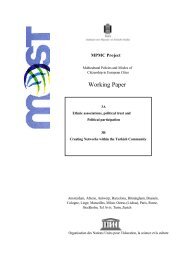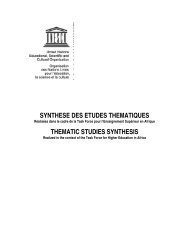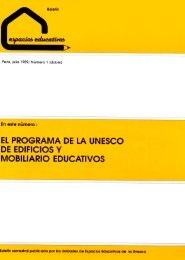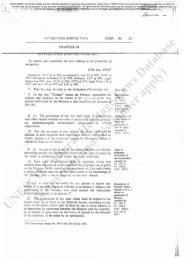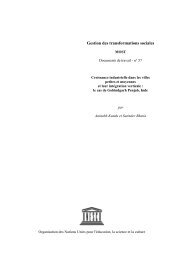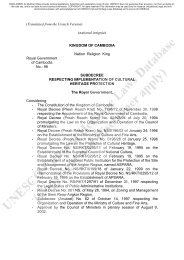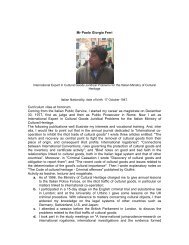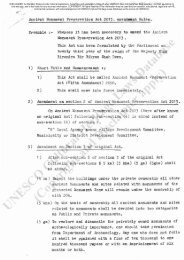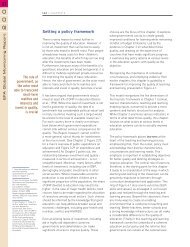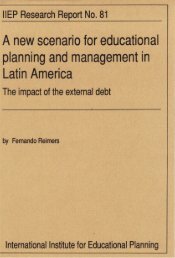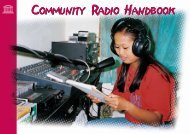Chapter 2. Progress towards the EFA goals - Unesco
Chapter 2. Progress towards the EFA goals - Unesco
Chapter 2. Progress towards the EFA goals - Unesco
Create successful ePaper yourself
Turn your PDF publications into a flip-book with our unique Google optimized e-Paper software.
0<br />
1<br />
0<br />
CHAPTER 2<br />
2<br />
Education for All Global Monitoring Report<br />
It is crucial<br />
for reading<br />
difficulties to be<br />
detected early<br />
and acted<br />
upon quickly<br />
40. The positive<br />
correlation between<br />
comprehension and oral<br />
reading fluency has been<br />
<strong>the</strong> subject of much<br />
research. For additional<br />
examples see Kudo and<br />
Bazan (2009) and RTI<br />
International (2008).<br />
41. In <strong>the</strong> United States,<br />
children are identified as<br />
being at risk of developing<br />
learning difficulties if <strong>the</strong>ir<br />
reading speed is below<br />
seventy words per minute<br />
in grade 2 and below<br />
eighty in grade 3.<br />
4<strong>2.</strong> It is not possible to<br />
compare across countries<br />
in <strong>the</strong> table owing to <strong>the</strong><br />
different languages used<br />
and differences in <strong>the</strong><br />
ages of student<br />
populations.<br />
Teaching reading in <strong>the</strong> early<br />
primary grades is crucial for learning<br />
Children lacking reading and comprehension<br />
skills are unable to use textbooks and o<strong>the</strong>r<br />
written materials and to take advantage of learning<br />
opportunities in or out of school. Research shows<br />
that children who have difficulties acquiring <strong>the</strong>se<br />
skills in <strong>the</strong>ir early lives are likely to struggle<br />
throughout <strong>the</strong>ir school careers (Jukes et al.,<br />
2006). Schools in many developing countries are<br />
failing to equip young learners with <strong>the</strong>se basic<br />
skills. If <strong>the</strong> <strong>EFA</strong> quality goal is to be achieved,<br />
it is crucial for reading difficulties to be detected<br />
early and acted upon quickly.<br />
Understanding is central to <strong>the</strong> achievement of<br />
reading skills. Children need to be able to read<br />
with sufficient fluency to obtain meaning from<br />
what is being read. Reading accurately and quickly<br />
has been shown in many cases to be strongly<br />
correlated with comprehension (Abadzi, 2006;<br />
Fuchs et al., 2001). In a small-scale survey of<br />
Peruvian first and second graders, children who<br />
could answer a set of three comprehension<br />
questions correctly read on average at seventyseven<br />
words per minute, compared with fifteen<br />
words per minute for children who only answered<br />
one comprehension question correctly (Abadzi<br />
et al., 2005). 40 Early grade reading assessments<br />
aim to test comprehension by measuring reading<br />
fluency (Box <strong>2.</strong>24). Estimates vary, but reading<br />
fluency in excess of forty words per minute<br />
is thought to be required for comprehension<br />
(Abadzi, 2006). 41<br />
Small-scale reading assessments conducted in<br />
several low-income countries paint a worrying<br />
picture (Table <strong>2.</strong>7). 42 While <strong>the</strong>se tests are not<br />
nationally representative, <strong>the</strong>y often point to<br />
very low levels of fluency in reading. Average<br />
performance in many test sites falls far short of<br />
automatic reading, implying that large numbers<br />
of children are failing to achieve <strong>the</strong> basic reading<br />
skills necessary to facilitate fur<strong>the</strong>r learning:<br />
In Gambia, children in grades 1 to 3 were able,<br />
on average, to read six words correctly in a<br />
minute.<br />
In Liberia, grade 2 students could read eighteen<br />
words per minute. Although fluency increased<br />
in grade 3, it was still below <strong>the</strong> estimated forty<br />
words per minute required for comprehension.<br />
Looking beyond <strong>the</strong> averages reveals <strong>the</strong> poor<br />
outcomes for some children:<br />
In Ethiopia, a 2008 study of grade 3 students<br />
in Woliso district found that 36% could not read<br />
a single word in Afan Oromo, <strong>the</strong> local language<br />
(DeStefano and Elaheebocus, 2009).<br />
In Guatemala, two-thirds of students could read<br />
more than forty words correctly per minute but<br />
wide disparities across language groups existed.<br />
Students whose mo<strong>the</strong>r tongue was Mam had<br />
average reading speeds below forty words per<br />
minute whereas students whose mo<strong>the</strong>r tongue<br />
was Quiche or Spanish read more than sixty<br />
words per minute (Dowd, 2009).<br />
Assessing reading skills early in primary school<br />
provides an opportunity to identify children with low<br />
learning achievement and take remedial measures<br />
that can help prevent dropout and grade repetition.<br />
It is far less time-consuming and costly to prevent<br />
low achievement at an early age than to act later.<br />
Evidence from several countries demonstrates<br />
that policy interventions can make a difference<br />
in improving reading skills. Involving schools and<br />
communities is a key to success. A programme<br />
operated by a non-government organization in<br />
Uttar Pradesh, India, has used ‘remedial reading<br />
camps’ run by volunteer trainers to achieve<br />
impressive improvements in early reading<br />
(Box <strong>2.</strong>25). In <strong>the</strong> Malindi district of Kenya, teachers<br />
were trained for five days on a set of carefully<br />
designed lessons to teach effective reading skills<br />
to grade 2 students (Crouch et al., 2009). Significant<br />
improvements resulted: comparing grade 2 results<br />
before and after teachers were trained showed that<br />
reading speeds had improved by 80%, on average.<br />
While it is difficult to attribute all <strong>the</strong> improvement<br />
to <strong>the</strong> training, <strong>the</strong> study showed that this relatively<br />
small intervention and <strong>the</strong> information it generated<br />
on <strong>the</strong> poor state of reading skills contributed<br />
significantly. 43 Pilot studies in Mali and <strong>the</strong> Niger<br />
in 2007 also demonstrated promising approaches<br />
to improving reading skills at relatively low cost<br />
(Mitton, 2008).<br />
Whe<strong>the</strong>r such pilot programmes can be scaled up<br />
to improve reading across national education<br />
43. The study was set up as a randomized trial but improvement in<br />
reading skills was seen in schools where <strong>the</strong> teachers had received <strong>the</strong><br />
training as well as in <strong>the</strong> schools where <strong>the</strong>y did not. The study showed<br />
that leakage of teaching techniques and <strong>the</strong> transfer of teachers between<br />
control and treatment schools accounted for similar improvements in<br />
both types of schools.<br />
112



